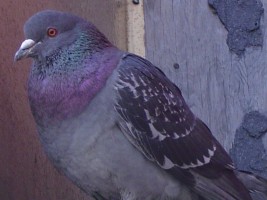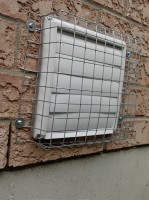
Psittacosis — also known as parrot fever, and ornithosis — is a zoonotic infectious disease caused by a bacterium called Chlamydophila psittaci and contracted from parrots, such as macaws, cockatiels and budgerigars, and pigeons, sparrows, ducks, hens, gulls and many other species of bird. The incidence of infection in canaries and finches is believed to be lower than in psittacine birds.
In certain contexts, the word “psittacosis” is used when the disease is carried by any species of bird belonging to the Psittacidaefamily, whereas “ornithosis” is used when other birds carry the disease.
What are the signs of infection among birds?
Chlamydia psittaci infects wild and domestic birds and poultry. Birds which contract the infection include parrots, canaries, pigeons, chickens, ducks, and turkeys. The time between exposure to Chlamydia psittaci and the onset of illness in caged birds ranges from three days to several weeks. Sick birds show signs of:
- sleepiness,
- shivering,
- weight loss,
- breathing difficulties,
- diarrhea.
Birds can have a latent infection. “Latent” means they appear healthy and do not show any symptoms now but they can show symptoms later. These infected birds carrying the Chlamydia psittaci bacteria may shed the organism intermittently or sometimes continuously for weeks or months. Stress associated with nutritional deficiencies, overcrowding, breeding, egg-laying and prolonged transport may cause birds with a latent infection to shed infectious agents. When shedding occurs, the infected birds excrete the bacteria in the feces and nasal discharges and the bacteria can remain infective for several months.
How do birds pass on the infection to humans?
 Humans can become infected with Chlamydia psittaci by breathing in the organism when the urine, respiratory secretion, or dried feces of infected birds is aerosolized (i.e., dispersed in the air as very fine droplets or dust particles).
Humans can become infected with Chlamydia psittaci by breathing in the organism when the urine, respiratory secretion, or dried feces of infected birds is aerosolized (i.e., dispersed in the air as very fine droplets or dust particles).
Other sources of exposure include mouth-to-beak contact, a bite from an infected bird, and handling the plumage and tissues of infected birds.
What are the signs of infection among humans?
When a person breathes in Chlamydia psittaci bacteria, the lungs’ defense mechanisms attempt to neutralize them. The bacteria that avoid this defense start an infection that varies in severity from a mild flu-like illness to severe pneumonia. Generally, the signs and symptoms appear within four to 15 days after exposure but commonly occur after 10 days. These include:
- fever,
- chills,
- cough,
- weakness or fatigue,
- muscle and chest pain,
- loss of appetite,
- nausea,
- vomiting,
- diarrhea,
- headache,
- sweating,
- abnormal intolerance to light.
Psittacosis is primarily a lung disease but it can involve several organs. Some reports show that inflammation of the liver, lining of the heart cavity, the heart muscle, and the brain can occur.
The course of the disease is variable and it can result in death. However, fatal cases are rare. In mild cases, fever may continue for three weeks or more.
How can we control psittacosis?
Preventive measures include feeding birds properly, avoiding overcrowding, and adequate ventilation systems including the use of high efficiency particulate air (HEPA) filters to reduce the spread of contaminated air. Any cleanup of bird droppings should be left to professionals, who have the proper safety equipment.
 It is also important for homeowners to contact a professional wildlife control company to to remove any birds from their homes, and keep them out using prevention methods like sealing wall vents and chimneys to minimize the risk of spreading disease. Handling birds, and the associated clean up should be left to professionals, who have the training, equipment and experience to deal with the situation without spreading disease or bacteria from the bird droppings.
It is also important for homeowners to contact a professional wildlife control company to to remove any birds from their homes, and keep them out using prevention methods like sealing wall vents and chimneys to minimize the risk of spreading disease. Handling birds, and the associated clean up should be left to professionals, who have the training, equipment and experience to deal with the situation without spreading disease or bacteria from the bird droppings.
Warm nest sites like chimneys, attics and vents are prime targets for birds looking for a place to nest. Pest birds can harbour over 40 types of parasites and host internally 60 types of infectious diseases that can be spread to you, your family, employees and pets when dried bird droppings become airborne.
Protect your home and your health from birds by calling Skedaddle Humane Wildlife Control today: 1-877-222-9453
Proudly serving: Ottawa, Montreal, Halifax, Hamilton, Burlington, Oakville, Mississauga, Brampton, Kitchener-Waterloo, Guelph, St.Catharines, Sudbury, Cambridge and the Niagara Region.


